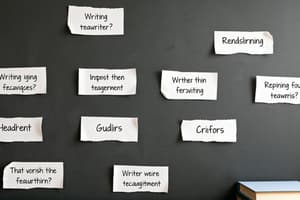Podcast
Questions and Answers
Which prewriting strategy involves generating ideas without judgment?
Which prewriting strategy involves generating ideas without judgment?
- Brainstorming (correct)
- Audience Analysis
- Outlining
- Research
What is the primary goal of outlining in the prewriting process?
What is the primary goal of outlining in the prewriting process?
- To establish a writing voice
- To generate random ideas
- To organize thoughts systematically (correct)
- To gather information from sources
Which drafting technique focuses on maintaining momentum while writing?
Which drafting technique focuses on maintaining momentum while writing?
- Proofreading
- Free Writing
- Focused Drafting
- Time Management (correct)
What is the objective of proofreading in the editing process?
What is the objective of proofreading in the editing process?
During the revising stage, what does 'Content Review' primarily involve?
During the revising stage, what does 'Content Review' primarily involve?
What aspect does 'Organization Analysis' focus on during the revision process?
What aspect does 'Organization Analysis' focus on during the revision process?
What drafting technique emphasizes writing continuously without focusing on errors?
What drafting technique emphasizes writing continuously without focusing on errors?
Which editing skill ensures uniform style and terminology throughout a document?
Which editing skill ensures uniform style and terminology throughout a document?
In revising, 'Multiple Drafts' is important because it indicates what?
In revising, 'Multiple Drafts' is important because it indicates what?
What is the main purpose of Audience Analysis in prewriting?
What is the main purpose of Audience Analysis in prewriting?
What is indicated by 'S' and 'F' in the grammar section?
What is indicated by 'S' and 'F' in the grammar section?
Which type of sentence is represented by 'Where will you find most of the lakes in Africa ____'?
Which type of sentence is represented by 'Where will you find most of the lakes in Africa ____'?
In the sentence 'This flower is a primrose.', what is the simple subject?
In the sentence 'This flower is a primrose.', what is the simple subject?
What should be included at the top of the test after the student's name?
What should be included at the top of the test after the student's name?
What is the main focus of the instructions for the placement test?
What is the main focus of the instructions for the placement test?
What part of speech is the word 'down' in the sentence 'The children run down the lane to school'?
What part of speech is the word 'down' in the sentence 'The children run down the lane to school'?
In the sentence 'Put your trust in the Lord', which word acts as a preposition?
In the sentence 'Put your trust in the Lord', which word acts as a preposition?
Identify the verb tense in the sentence 'We planted ivy and ferns.'
Identify the verb tense in the sentence 'We planted ivy and ferns.'
Which of the following sentences correctly uses a conjunction?
Which of the following sentences correctly uses a conjunction?
What is the function of the italicized word 'delicious' in the sentence 'The fish tasted delicious'?
What is the function of the italicized word 'delicious' in the sentence 'The fish tasted delicious'?
Flashcards are hidden until you start studying
Study Notes
Prewriting Strategies
- Brainstorming: Generate ideas freely without judgment. Use lists, mind maps, or free writing.
- Outlining: Organize thoughts into a structured format. Create a hierarchical outline to guide the writing.
- Research: Gather information from credible sources to support ideas. Take notes and track sources.
- Audience Analysis: Identify the target audience and tailor content to their interests and understanding.
- Purpose Definition: Clarify the purpose of the writing (e.g., inform, persuade, entertain) to guide content.
Drafting Techniques
- Free Writing: Write continuously for a set time without worrying about grammar or structure.
- Focused Drafting: Write sections of the piece based on the outline, concentrating on conveying ideas.
- Voice and Tone: Establish a consistent voice and tone appropriate for the audience and purpose.
- Time Management: Allocate specific periods for drafting to maintain momentum and avoid procrastination.
- Use of Technology: Utilize writing software and tools (e.g., word processors, grammar checkers) for efficiency.
Editing Skills
- Proofreading: Check for spelling, grammar, and punctuation errors. Focus on surface-level issues.
- Consistency Check: Ensure uniformity in style, tone, formatting, and terminology throughout the document.
- Sentence Structure: Vary sentence lengths and structures for improved readability and engagement.
- Clarity and Conciseness: Eliminate unnecessary words, jargon, and redundancies for clearer communication.
- Feedback Incorporation: Seek input from peers or mentors and integrate constructive criticism into the text.
Revising Methods
- Content Review: Assess the overall structure and argument. Ensure all points are well-developed and relevant.
- Organization Analysis: Check the logical flow of ideas. Rearrange paragraphs or sections for better coherence.
- Perspective Shift: Read from the audience's perspective to evaluate clarity and impact.
- Multiple Drafts: Expect to create several drafts; each should build on the previous version.
- Final Review: Conduct a thorough final check focusing on both content and formatting before submission.
Prewriting Strategies
- Brainstorming encourages the free generation of ideas without judgment, using methods like lists, mind maps, or free writing to stimulate creativity.
- Outlining involves organizing thoughts into a structured format, creating a hierarchical outline that serves as a guide for writing.
- Research is crucial for gathering information from credible sources to back up ideas, necessitating careful note-taking and source tracking.
- Audience analysis is the process of identifying the target readership and customizing content to engage their interests and understanding effectively.
- Purpose definition requires clarifying the writing's intention, whether to inform, persuade, or entertain, guiding the content development process.
Drafting Techniques
- Free writing allows writers to produce text continuously for a designated time, disregarding grammatical errors or structural concerns, fostering creativity.
- Focused drafting emphasizes writing specific sections of the piece as outlined, concentrating on effectively conveying ideas.
- Establishing a consistent voice and tone is vital to ensure that the writing resonates with the intended audience and aligns with the overall purpose.
- Time management involves allocating dedicated periods for drafting, helping maintain writing momentum and reducing the tendency to procrastinate.
- The use of technology, including word processors and grammar checkers, enhances writing efficiency and helps streamline the drafting process.
Editing Skills
- Proofreading focuses on identifying and correcting surface-level errors in spelling, grammar, and punctuation to improve overall writing quality.
- A consistency check ensures uniformity in style, tone, formatting, and terminology throughout the document for a cohesive reading experience.
- Varying sentence structure and length enhances readability and keeps readers engaged by preventing monotony.
- Clarity and conciseness are achieved by removing unnecessary words, jargon, and redundancies, leading to more effective communication.
- Feedback incorporation involves gathering input from peers or mentors and constructively integrating their criticisms into the revised text.
Revising Methods
- Content review entails assessing the overall structure and arguments contained within the piece, ensuring that all points are sufficiently developed and relevant.
- Organization analysis checks for the logical flow of ideas, allowing for the rearrangement of paragraphs or sections to enhance coherence.
- Perspective shift requires reading the text from the audience's viewpoint to evaluate clarity and effectiveness of the writing.
- Multiple drafts are anticipated in the writing process, with each draft designed to build upon and improve the previous version.
- A final review involves conducting a meticulous check focusing on both content accuracy and formatting before the text is submitted.
Placement Test Instructions
- Tests must be printed, completed by the student, and returned via email.
- Use only student’s work for accurate placement; outside help is prohibited.
- Include the student's name and time taken on the first page.
Grammar Section
- Identify sentences as complete sentences (S) or fragments (F).
- Separate complete subject and predicate, underlining the simple subject and predicate appropriately.
- Classify sentences as declarative, interrogative, imperative, or exclamatory, adding correct punctuation.
- Categorize italicized words as nouns, pronouns, or adjectives.
- Label italicized words as verbs, adverbs, prepositions, conjunctions, or interjections.
- Identify prepositional phrases and underline prepositions.
- Indicate verb tenses (present, past, future) in given sentences.
- Combine sentence pairs using suitable conjunctions.
- Classify italicized words as direct objects, predicate nouns, or predicate adjectives.
- Correct capitalization errors in example sentences.
- Add commas and end punctuation where necessary.
Vocabulary / Comprehension Questions
- Understand key vocabulary terms such as "alleviation," "deprived," "condescended," "sedate," "cortege," and "efficacious" with provided definitions.
- Respond in complete sentences for comprehension questions based on "The Light Princess."
- Address how the Princess's gravity was restored, changes in her behavior in the water, suggestions made for her cure, actions taken by the king, and limitations of life without gravity with personal preference on the matter.
6th Grade Writing Task
- Select a task from four options: making a sandwich, setting the dinner table, caring for a pet, or wrapping a gift.
- Write in cursive, complete sentences, and paragraph form, with detailed, step-by-step instructions.
- Word count of 100-150 words required.
Studying That Suits You
Use AI to generate personalized quizzes and flashcards to suit your learning preferences.




